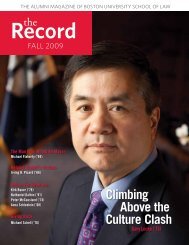the nature of representation: the cherokee right ... - Boston University
the nature of representation: the cherokee right ... - Boston University
the nature of representation: the cherokee right ... - Boston University
Create successful ePaper yourself
Turn your PDF publications into a flip-book with our unique Google optimized e-Paper software.
2005] THE NATURE OF REPRESENTATION 121<br />
<strong>the</strong> present confederation, and to form a state where<strong>of</strong> <strong>the</strong> Delaware nation shall<br />
be <strong>the</strong> head, and have a <strong>representation</strong> in Congress: Provided, nothing<br />
contained in this article to be considered as conclusive until it meets with <strong>the</strong><br />
approbation <strong>of</strong> Congress. 153<br />
More important than <strong>the</strong> loose promise <strong>of</strong> <strong>representation</strong> are <strong>the</strong> qualifications<br />
placed on this particular promise: <strong>the</strong> <strong>representation</strong> is only associated with future<br />
statehood and no part <strong>of</strong> <strong>the</strong> promise is “conclusive” until Congress approves <strong>of</strong><br />
it. 154<br />
It is not clear whe<strong>the</strong>r under <strong>the</strong> 1778 treaty <strong>the</strong> Delawares would have any<br />
present <strong>right</strong>s, and similarly <strong>the</strong> Cherokee Treaty <strong>of</strong> Hopewell in 1785 does not<br />
provide any real <strong>right</strong> to <strong>representation</strong> in Congress. Article XII <strong>of</strong> <strong>the</strong> Treaty <strong>of</strong><br />
Hopewell reads: “That <strong>the</strong> Indians may have full confidence in <strong>the</strong> justice <strong>of</strong> <strong>the</strong><br />
United States, respecting <strong>the</strong>ir interests, <strong>the</strong>y shall have <strong>the</strong> <strong>right</strong> to send a deputy<br />
<strong>of</strong> <strong>the</strong>ir choice, whenever <strong>the</strong>y think fit, to Congress.” 155 The meaning <strong>of</strong> <strong>the</strong> “<strong>right</strong><br />
to send a deputy” was a side issue addressed in Cherokee Nation v. Georgia, with<br />
<strong>the</strong> Supreme Court ultimately deciding that a deputy <strong>right</strong> was not a representative<br />
<strong>right</strong>. 156<br />
In Cherokee Nation, <strong>the</strong> Justices wrote in dicta that <strong>the</strong> <strong>right</strong> to send a deputy<br />
did not impose upon <strong>the</strong> U.S. government any obligation to <strong>the</strong> Cherokees in<br />
terms <strong>of</strong> <strong>the</strong>ir participation in <strong>the</strong> national government. 157 However, <strong>the</strong> <strong>right</strong> was<br />
not devoid <strong>of</strong> meaning. Writing for <strong>the</strong> majority, Chief Justice Marshall felt<br />
compelled to highlight <strong>the</strong> singular <strong>nature</strong> <strong>of</strong> <strong>the</strong> promise: “The Cherokees in<br />
particular were allowed by <strong>the</strong> treaty <strong>of</strong> Hopewell, which preceded <strong>the</strong> constitution,<br />
‘to send a deputy <strong>of</strong> <strong>the</strong>ir choice, whenever <strong>the</strong>y think fit, to congress.’” 158<br />
In his<br />
dissent, Justice Baldwin observed <strong>the</strong> potentially far<strong>the</strong>r reaching, though<br />
complicated, <strong>nature</strong> <strong>of</strong> <strong>the</strong> promise when he stated, “<strong>the</strong> meaning <strong>of</strong> <strong>the</strong> words<br />
‘deputy to congress’ in <strong>the</strong> twelfth article may be as a person having a <strong>right</strong> to sit<br />
in that body, as at that time it was composed <strong>of</strong> delegates or deputies from <strong>the</strong><br />
states, not as at present, representatives <strong>of</strong> <strong>the</strong> people <strong>of</strong> <strong>the</strong> states; or it may be as<br />
153<br />
Treatywith<strong>the</strong>Delawares,U.S.-Delawares,Sept.17,1778,7Stat.13.<br />
154<br />
The Delaware’s treaty promise <strong>of</strong> <strong>representation</strong> in Congress upon formation <strong>of</strong> a<br />
state, once it “meets with <strong>the</strong> approbation <strong>of</strong> Congress,” was satisfied according to <strong>the</strong><br />
influential removal era William Penn essays, for as Evarts writes, “That [Article 6] did<br />
meet with <strong>the</strong> approbation <strong>of</strong> Congress is manifest; because it is now part <strong>of</strong> a national<br />
treaty.” JEREMIAH EVARTS, ESSAYS ON THE PRESENT CRISIS IN THE CONDITION OF THE<br />
AMERICAN INDIANS (signed by William Penn, 1829), reprinted in CHEROKEE REMOVAL:<br />
THE “WILLIAM PENN” ESSAYS AND OTHER WRITINGS 93 (Francis Paul Prucha ed., 1981).<br />
155<br />
Treaty with <strong>the</strong> Cherokee, U.S.-Cherokee, Nov. 28, 1785, 7 Stat. 18.<br />
156<br />
30 U.S. (5 Pet.) 1, 17 (1831).<br />
157<br />
Id.; but see, House Debate on <strong>the</strong> Indian Removal Question, supra note 29,<br />
(statement <strong>of</strong> Rep. Henry Storrs) (citing <strong>the</strong> Deputy promise in <strong>the</strong> Congressional<br />
debates on removal as evidence that <strong>the</strong> Indians were not mere “serfs” transferred from<br />
<strong>the</strong> English crown to <strong>the</strong> U.S. government).<br />
158<br />
Cherokee Nation, 30 U.S. (5 Pet.) at 17.









